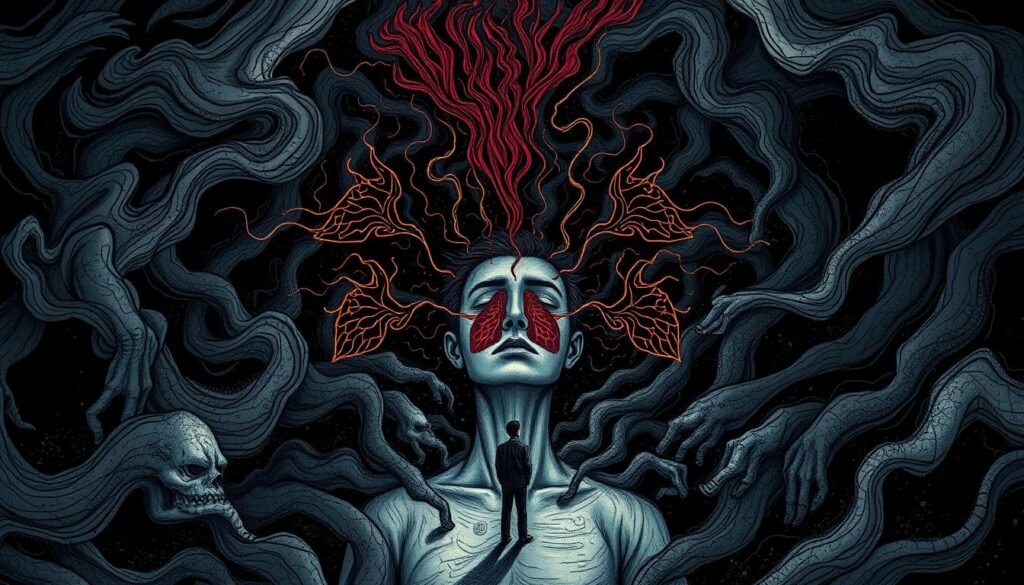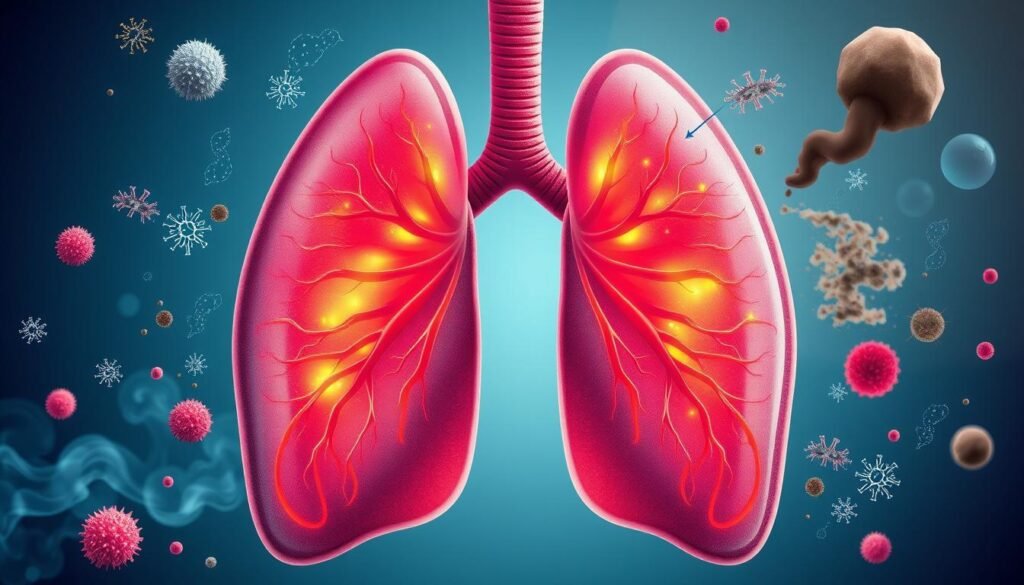Up to 40% of people with anxiety mention they often feel short of breath. This symptom might make them think they have a serious problem. It’s important to know how to tell if your shortness of breath is due to anxiety. This knowledge is key to managing symptoms and getting the right help.
Feeling like you can’t breathe deeply or breathing too fast are signs of shortness of breath, also called dyspnea. Anxiety sets off a physical reaction in your body. It releases stress hormones, causing the ‘fight-or-flight’ response. This might make your heart beat faster and make you feel dizzy or shaky, increasing your panic.
Becoming aware of why you’re having trouble breathing is a big step. It helps you tell the difference between anxiety and other health issues. This makes it easier to seek help from doctors when anxiety affects your life a lot.
Key Takeaways
- 40% of people with anxiety disorders experience shortness of breath.
- Shortness of breath can mimic other medical conditions.
- Anxiety often triggers a ‘fight-or-flight’ response.
- Understanding symptoms is crucial for appropriate treatment.
- Seeking professional help is recommended for severe cases.
Understanding Shortness of Breath
Shortness of breath, known as dyspnea, comes from many sources. It can be due to asthma, chronic obstructive pulmonary disease (COPD), or even anxiety. Understanding dyspnea means knowing how our bodies react when we can’t breathe easily. This often leads to a scary feeling of panic.
When we’re anxious, we might feel our heart beat faster and our muscles tense up. It’s hard to breathe. Our bodies then release stress hormones, cortisol and adrenaline. This causes big changes including how we breathe, often leading to faster, shallower breaths. This makes the feeling of not being able to breathe even worse.
Studies show a clear link between anxiety and trouble breathing. People with anxiety disorders tend to breathe differently. They feel like they can’t get enough air. If you’re having trouble breathing and also feeling chest pain or dizzy, it’s important to see a doctor right away.
Trying relaxation techniques like deep breathing or light exercise can help with anxiety and breathing troubles. To really manage anxiety, treatments like cognitive behavioral therapy (CBT) and some medications work well. They help lessen anxiety symptoms, including feeling short of breath. It’s important to really understand dyspnea to treat it right. For more info, check out Healthline.
What is Anxiety?
Anxiety is a complex feeling made up of stress, worry, and nervousness. The definition of anxiety includes a variety of situations that people encounter when facing threats or challenges. It affects individuals differently, changing in how strong and long it lasts, and can impact day-to-day life.
There are different types of anxiety disorders, like generalized anxiety disorder, panic disorder, and social anxiety disorder. Each one has its own set of challenges and symptoms. Anxiety disorders are an important mental health issue. They affect people emotionally and physically.
Physical signs of anxiety can show up in many ways, including a fast heartbeat, hyperventilation, and shortness of breath (dyspnea). These signs can be confusing because they seem like other serious health problems. Anxiety can also cause chest pain, a feeling of choking, dizziness, shaking, and feeling sick. This makes dealing with anxiety even harder.
It’s important to understand these symptoms and how they can be mixed up with other health issues. People with anxiety disorders might find their lives are not as good because of these physical feelings. Learning how to manage stress and doing relaxation exercises can help a lot. Knowing how our minds and bodies are connected can make treating anxiety better.
How Anxiety Leads to Shortness of Breath
Anxiety can lead to various physical reactions. One common symptom is shortness of breath, or dyspnea. This happens because of the body’s fight or flight response, which boosts stress hormones like adrenaline and cortisol. When this happens, people may breathe faster. This can cause anxiety-induced breathing issues, making it hard to catch your breath.
The link between anxiety and trouble breathing is strong. It’s because of how our bodies react to stress. When anxious, people often breathe too fast, which can mess up gas levels in blood. This leads to feeling faint and out of breath. Knowing this helps tell apart anxiety-related breathing problems from other issues like asthma.
To deal with these problems, try special breathing and grounding exercises. Getting help from a mental health professional is important too. Cognitive-behavioral therapy can be really effective. For more tips on handling these symptoms, check out this guide.
Common Symptoms of Anxiety
Anxiety shows up in various anxiety symptoms that impact mind and body alike. People may feel nervous, restless, or irritable. It’s often hard to concentrate as worries seem to take over everyday life.
These mental challenges are often joined by physical symptoms of anxiety. These include muscle tightness, fast breathing, and feeling out of breath. Knowing these signs is key to identifying anxiety-related issues.
The following table lays out common anxiety symptoms and their physical signs:
| Symptoms | Physical Manifestations |
|---|---|
| Nervousness | Muscle tension |
| Restlessness | Hyperventilation |
| Irritability | Heart palpitations |
| Difficulty concentrating | Chest pain |
| Rapid heart rate | Choking sensation |
| Dizziness | Tingling in limbs |
| Nausea | Trembling and shaking |
| Dry mouth |
Grasping these anxiety symptoms and their physical effects helps people in identifying anxiety-related issues well. Getting help and finding treatments suited to these symptoms can improve life significantly.

Additional Causes of Shortness of Breath
Shortness of breath, also known as dyspnea, comes from many health issues related to breathing. While anxiety often plays a role, other conditions like asthma, COPD, heart failure, and pneumonia are also major factors. It’s important to know the causes of shortness of breath for the right treatment.
Asthma and COPD are common causes of breathing problems. Asthma leads to symptoms like wheezing and chest tightness. COPD, which gets worse over time, causes similar issues. Knowing about these medical conditions affecting breathing helps doctors create effective treatment plans.
Chronic dyspnea covers many health areas. It can come from issues with the lungs, heart, or even the stomach area. Problems like pulmonary embolism and lung disease need quick attention to avoid worse issues.
Tests like spirometry and chest CT scans help find the reasons for dyspnea. A full check-up, including a patient’s history and a physical exam, is vital. Doctors use special tests to see how activities affect breathing.
Lifestyle choices, like smoking or contact with allergens, can also cause breathing problems. Changes in lifestyle are often needed to manage these. If breathing issues pop up suddenly or don’t improve with normal care, seeing a doctor is crucial. To learn more about different causes of shortness of breath, check this helpful resource.
Shortness of Breath Due to Anxiety Disorders
Anxiety disorders can cause many symptoms. Shortness of breath is a common one. This problem, known as dyspnea, creates a tough cycle. Anxiety leads to breathlessness, which then makes anxiety worse. Knowing about anxiety-related dyspnea is key. It helps people tell it apart from other medical issues.
Those with an anxiety disorder may worry a lot. They might also have a fast heartbeat and difficulty breathing. It’s important to know these symptoms are not rare. They often happen with anxiety. Certain situations can make people with anxiety feel more scared. They may panic and struggle to breathe. This can make their anxiety even stronger.
Not everyone with anxiety will have trouble breathing. Diagnosing anxiety disorders means looking at ongoing worry and physical signs like shortness of breath. There are different treatments available. Medications and therapy have helped many.

Using relaxation methods can also help. Diaphragmatic breathing and mindfulness are two examples. They help people with anxiety control their breathing. This reduces their distress. It’s still crucial to get advice from a doctor, especially if symptoms do not improve.
Shortness of Breath Due to Panic Attacks
Panic attacks bring sudden, intense fear that can overwhelm you. They often cause difficulties breathing, chest pain, and dizziness. These symptoms come quickly and can be scary. It’s important to know the signs of a panic attack to handle them better. Attacks usually reach their peak in minutes. This can lead to more anxiety and fear of another attack.
Symptoms Associated with Panic Attacks
Symptoms of panic attacks appear suddenly and can include:
- Shortness of breath
- Chest pain
- Sweating
- Palpitations
- Dizziness or light-headedness
- Numbness or tingling
- Feelings of unreality or detachment
Knowing these signs is important to tell panic attacks apart from other health issues. This is crucial because panic attacks can happen with asthma, making things more confusing.
Duration and Triggering Factors
Panic attacks often last less than 30 minutes but can feel longer. Stress, environment, and certain thoughts can trigger them. Knowing what triggers your panic attacks can help manage and maybe even prevent them. This knowledge can ease the difficulty breathing caused by panic.
| Triggering Factors | Potential Impact on Breathing |
|---|---|
| Stressful Situations | May lead to increased shortness of breath due to heightened anxiety |
| Crowds or Confined Spaces | Can induce feelings of claustrophobia, exacerbating breathlessness |
| Physical Exertion | May trigger panic attacks and panic-induced breathing difficulties |
| Negative Thought Patterns | Can trigger a panic attack due to anxiety responses |
It’s crucial to learn about the link between panic attacks and trouble breathing if you are at risk.
Shortness of Breath Due to Asthma and COPD
Asthma and COPD are chronic conditions that impact breathing. Around 25 million Americans have asthma, with symptoms ranging from mild to severe. These include chest tightness, wheezing, and persistent coughing. Environmental triggers like pollen and pet dander often worsen asthma symptoms. COPD, marked by declining lung health, causes serious breathing issues that interfere with daily activities.
Both conditions can cause chronic shortness of breath, stemming from various reasons. When shortness of breath lasts weeks or more, it usually indicates asthma, COPD, heart problems, or obesity. Effective asthma management includes a plan with quick-relief meds, such as bronchodilators, for symptom control during an attack.
It’s vital to distinguish between breathing problems from anxiety and chronic lung conditions for proper treatment. Anxiety can worsen asthma symptoms, making breathlessness feel more severe. Learning stress management and exercising regularly are key to maintaining lung health. These strategies also help reduce anxiety and lessen asthma attack severity.

| Condition | Characteristics | Common Symptoms |
|---|---|---|
| Asthma | Reversible inflammation and constriction of airways | Wheezing, coughing, chest tightness, shortness of breath |
| COPD | Progressive lung disease causing airflow limitation | Chronic cough, sputum production, dyspnea at exertion |
| Both Conditions | Can coexist and complicate breathing | Fatigue, anxiety, worsening shortness of breath |
Shortness of Breath Due to Heart Conditions
Many heart issues show signs like feeling out of breath. This can happen when you’re active or even resting. It’s key to notice signs of heart failure early on, as they point to deeper heart problems.
Heart Failure and Its Symptoms
Heart failure is serious and affects your daily life and health. You might feel:
- Shortness of breath doing everyday things or while lying down.
- Chest pain that feels like squeezing or heaviness.
- Tiredness that doesn’t go away with rest.
- Swelling in the legs from fluid buildup.
Noticing these signs early can help get the right treatment, helping protect your heart and live better.
Other Cardiac Issues to Consider
Other heart issues besides heart failure can also make you feel out of breath. For example, atrial fibrillation (AFib) is common and its symptoms can include:
| Symptom | Frequency |
|---|---|
| Shortness of breath | Occasionally or frequently |
| Fatigue | Common |
| Dizziness | Occasional |
| Chest pain | Intermittent |
It’s crucial to get checked by a doctor since undiagnosed issues like AFib can lead to serious problems, including heart failure and stroke. Knowing the symptoms of heart failure and other conditions is a big step in taking care of your heart health.
Differentiating Anxiety from Other Causes of Shortness of Breath
Shortness of breath, or dyspnea, is common and often worrying. Figuring out why it happens can be tricky. Anxiety is a big cause, but there are others too. We need to look at what else happens, why, and when to tell them apart. Anxiety can make breathing hard, from a little to a lot.
Anxiety can make you breathless suddenly, especially if you’re scared or stressed. Stress plays a big role in this symptom. You might breathe fast, feel out of breath, or have a tight chest. There’s a link between feeling anxious, your heart beating fast, and breathing too much.
Many medical issues can also make it hard to breathe. Think about asthma, allergies, heart issues, or blood clots in the lungs. Asthma symptoms can start slowly and get worse because of different things. Don’t just think it’s anxiety if breathing trouble comes on fast or doesn’t go away.
Getting professional advice is key. Doctors might need to run tests, like lung function tests, scans, or blood tests to find the cause. They’ll consider your health history, lifestyle, and stress too. This helps figure out if it’s anxiety or something else, and what to do next.
Anxiety disorders are very common, so finding help is important. Learning ways to handle anxiety, like CBT or mindfulness, can really help. For more about how anxiety shows up and what to do, check out this resource.
When to Seek Medical Attention
Shortness of breath can come from many causes. It’s important to pay attention to other symptoms that come with it. Signs like chest pain, nausea, or fainting are emergencies. They tell you when it’s critical to get medical help.
Knowing specific signs helps decide if urgent care is needed. Important symptoms to look for are:
- Severe shortness of breath that gets worse quickly
- Tightness in the chest or throat that doesn’t go away
- Feeling dizzy or lightheaded
- Heart beating fast or irregularly
- Sweating a lot or feeling heart palpitations
A doctor can tell if your shortness of breath is from anxiety or something more serious. It’s crucial to know your health history. This is especially true for those with breathing or heart problems. They should follow their doctor’s advice closely.
Being alert to symptoms is key to taking care of your health. If you’re not sure about your symptoms, always choose to see a doctor. This is vital if new symptoms appear or if current problems get worse. Trusting your gut can save your life.
Effective Management of Anxiety-Induced Shortness of Breath
Managing anxiety can really improve your life, especially if you get short of breath. There are several ways to deal with this. Techniques like breathing techniques for anxiety, meditation, and physical activity help. They lower stress and bring back calmness.
One of the top methods is diaphragmatic breathing. It changes rapid, shallow breaths to deep ones. This supports full oxygen flow, easing feelings of not being able to breathe. Box breathing is another good method. It has you inhale, hold, exhale, and hold again, all for the same time. These practices help relax you and reduce anxiety-led shortness of breath.
Mindfulness meditation helps you control emotions by staying in the now. By fully engaging in it, you understand what triggers your anxiety. This understanding helps deal with it better. Using apps like Mesmerize can add support, with calm visuals and sounds.
Being active is also key to fighting anxiety. It releases endorphins, which make you feel good and stress-free. Eating well, with lots of fruits, veggies, and lean protein, also helps keep your mood and energy even.
Using cognitive-behavioral techniques can be very helpful. They help you see and change negative thoughts that come with anxiety. For many, getting help from a mental health pro can offer custom coping strategies.
| Management Techniques | Description | Effectiveness |
|---|---|---|
| Diaphragmatic Breathing | Encourages deep breathing to improve oxygen exchange. | High |
| Box Breathing | Structured breathing method that reduces stress. | High |
| Mindfulness Meditation | Focuses on the present moment, enhancing emotional regulation. | Medium to High |
| Regular Physical Activity | Stimulates endorphin release for mood improvement. | High |
| Cognitive Behavioral Techniques | Identifies and reframes negative thought patterns. | Medium to High |
Using these strategies boosts confidence. It gives you tools to manage short breath caused by anxiety. Tackling anxiety in many ways leads to a healthier, balanced life.
Conclusion
Knowing the difference between anxiety-induced shortness of breath and other issues is key to better health. During stressful periods, like the COVID-19 pandemic, it’s important to understand what causes shortness of breath. This helps people take steps to improve their mental health.
When symptoms like a fast heartbeat and hyperventilation happen, it’s often due to anxiety, not physical problems. This knowledge allows for better handling of these issues. Removing these symptoms can lead to a big improvement in how someone feels.
Anxiety can cause physical symptoms that look like other health problems, such as asthma. It’s important to correctly figure out what’s wrong so the right treatment can be given. Using relaxation techniques, therapy, or fun activities can help those with anxiety-related breathing issues. This helpful article has more tips and ideas.
People with these symptoms should get help from doctors or therapists. Working on both anxiety and breathing problems is crucial for a better life. Understanding how anxiety affects breathing lets people manage their symptoms better. This leads to a more peaceful and strong way of living.